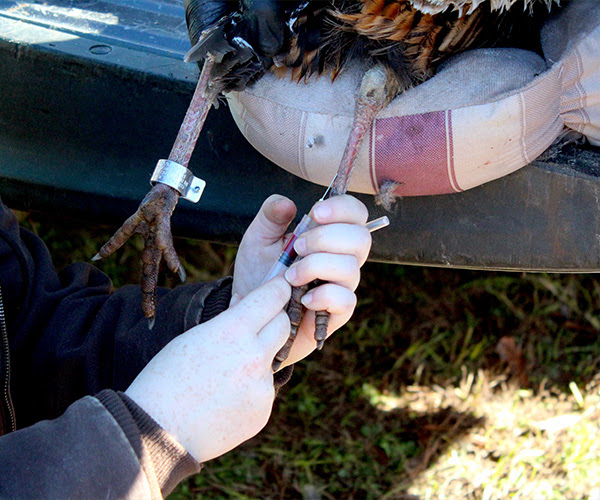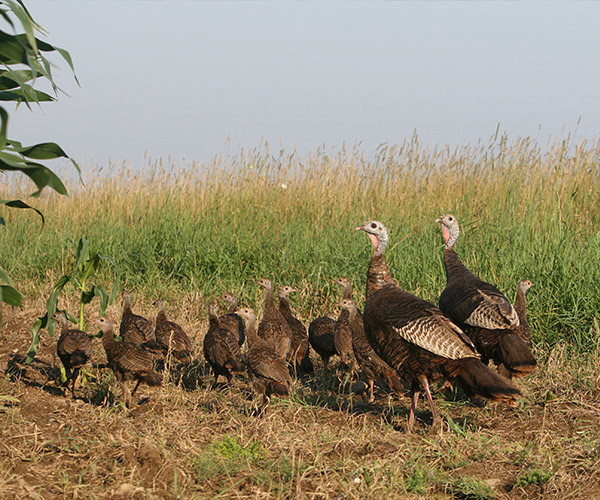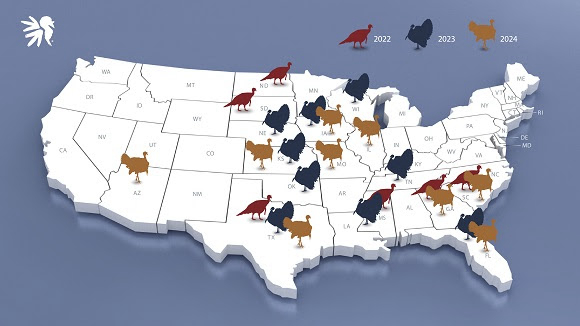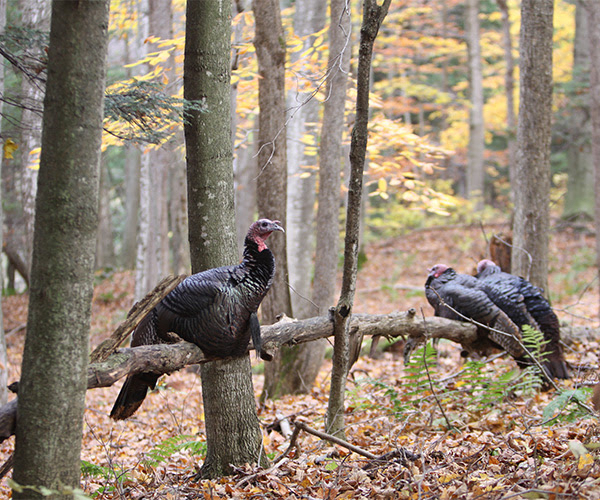State-of-the-Art Wild Turkey Research Continues for Second Year
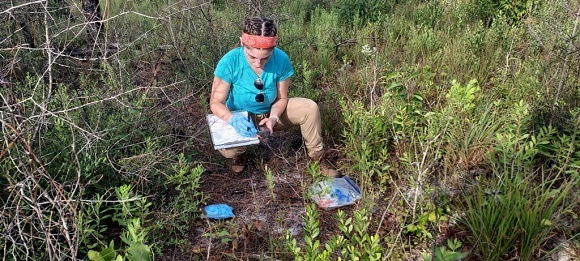
EDGEFIELD, S.C. — As part of its 2023 investment in wild turkey research, the NWTF is helping fund, for the second year, a unique wild turkey research project conducted by Mississippi State University and the Mississippi Department of Wildlife, Fisheries and Parks.
The research project utilizes recent advances in genetic analysis to better understand wild turkey ecology and how certain factors — such as hunting seasons, land type and management practices — can affect population densities.
In its second year, the project is improving estimates of various population data, which will allow state wildlife agencies and turkey managers to make better-informed decisions regarding management actions and hunting season frameworks, ultimately leading to a stronger population.
However, accurately gauging the number of wild turkeys on a particular landscape is complicated. Population estimates are often made using rough approximations that rely on anecdotal accounts, volunteer surveys and catch-per-unit information.
The other, more labor-intensive way wild turkey researchers and managers can estimate wild turkey numbers is by trapping and marking birds. While this method has provided valuable and insightful information for decades, it is expensive, takes a lot of personnel, is time-consuming and involves risks.
“Estimating the number of wild turkeys on the landscape using conventional methods has proven exceedingly difficult; the lack of accurate estimates is regarded as one of the primary impediments to a deeper understanding of wild turkey population biology and their response to management,” Dr. Dana Morin, Ph.D. said.
Morin is a co-principal investigator of the project along with Dr. Mark McConnell, Ph.D., both assistant professors at MSU.
With this project, Morin and additional researchers at MSU and MDWFP are circumnavigating the challenges typically associated with trapping and marking birds by collecting genetic material left behind in the field, such as feathers or fecal droppings.
These genetic materials are being analyzed with DNA-based lab techniques and identifying unique individual birds on eight sites throughout Mississippi. The experimental design includes sites with differing habitat types, management practices and turkey hunting seasons.
This new way to explore population densities effectively allows researchers to create a database of individual wild turkeys on a specific project site by analyzing genetic material in the field.
“We completed our first sampling season earlier this year and are currently working in the lab to extract DNA from the collected samples,” Morin said. “To date, 111 fecal samples and 16 feather samples are being analyzed. In addition, we are working with hunters across the state to collect tissue samples from their harvested birds. The tissue samples will be used to gain a greater understanding of population genetic structure across the state.”
In addition to creating a genetic map of wild turkeys across the state, Morin and the team have big plans for the next year of research, including:
- Estimating male and female turkey densities at study sites with different spring hunting season frameworks,
- Estimating male and female breeding season survival in relation to varying spring season frameworks,
- Evaluating the relationship between the poults-per-hen index and estimated population densities at both a site- and state level,
- Quantifying parasite, disease and aflatoxin prevalence in wild turkeys across different study sites and much more.
“One of the most common questions I get asked by hunters is, ‘how many turkeys can I take on my property,’” said Adam Butler, MDWFP wild turkey program coordinator and NWTF wild turkey technical committee representative. “Giving a science-based reply to that question has always been tough because getting precise estimates of the number of turkeys has always proven so difficult. We hope from this project to be able to provide a real-world starting place to answer those sorts of questions, while also helping to better understand why the number of turkeys might vary so much from place to place.”
By having well-grounded estimates of wild turkey populations across varying regions in Mississippi, researchers and managers can ascertain a deeper understanding of wild turkey ecology and their response to management and human influence, allowing the agency to deliver the best management practices at the best time, ultimately bolstering both wild turkey numbers and hunter satisfaction.
The NWTF will provide updates on this exciting new project as work continues. Stay tuned to NWTF.org.
This project is one of 10 research projects across nine states the NWTF is funding, with $582,374 invested among these vital projects. These projects are part of a nearly $9 million investment into wild turkey research in 2023, supported by the NWTF and its partners.
About the National Wild Turkey Federation
Since 1973, the National Wild Turkey Federation has invested over half a billion dollars into wildlife conservation and has conserved or enhanced over 22 million acres of critical wildlife habitat. The organization continues to drive wildlife conservation, forest resiliency and robust recreational opportunities throughout the U.S. by working across boundaries on a landscape scale.
2023 is the NWTF’s 50 th anniversary and an opportunity to propel the organization’s mission into the future while honoring its rich history. For its 50 th anniversary, the NWTF has set six ambitious goals: positively impact 1 million acres of wildlife habitat; raise $500,000 for wild turkey research; increase membership to 250,000 members; dedicate $1 million to education and outreach programs; raise $5 million to invest in technology and NWTF’s people; and raise $5 million to build toward a $50 million endowment for the future. Learn how you can help us reach these lofty goals.
National Wild Turkey Federation
PO Box 530
Edgefield South Carolina 29824
United States
For more information, contact Pete Muller at (803) 637-7698 or pmuller@nwtf.net



